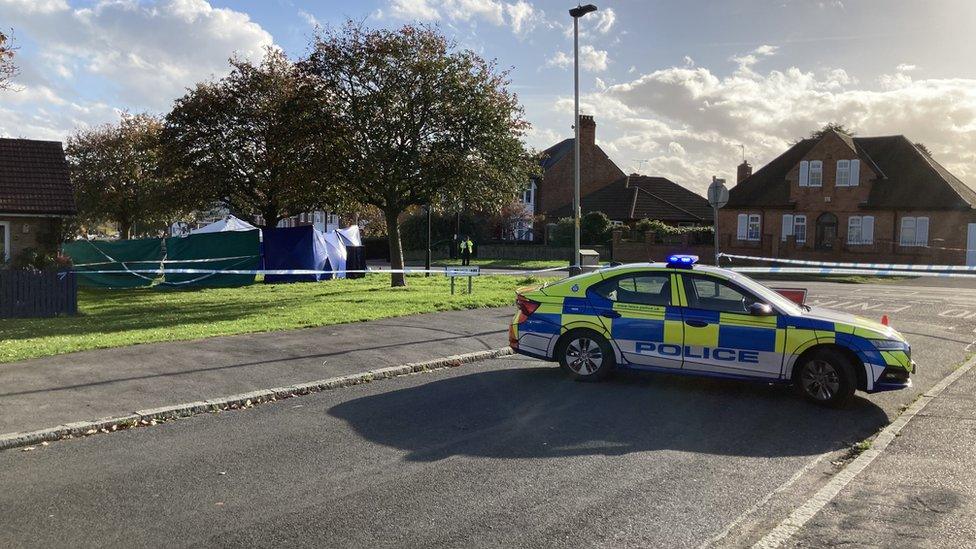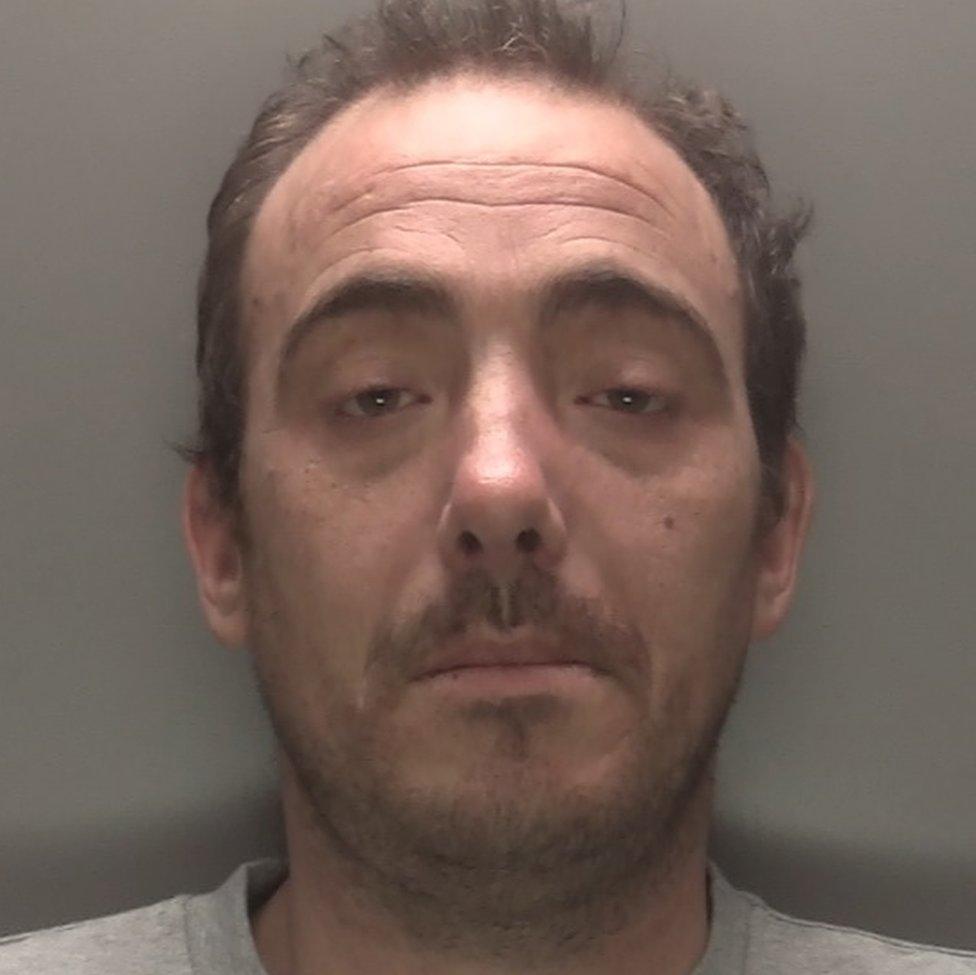Tehleigher Bunting: Family wants driver's sentence increased
- Published
Tehleigher Bunting was walking on a pavement with a friend when Aaron Carter killed her
The family of a 14-year-old girl who was killed by a speeding driver have asked for his sentence to be increased.
Aaron Carter was estimated to have been driving at about 55mph on a 30mph road before he mounted a pavement and hit Tehleigher Bunting in October.
She had been walking arm-in-arm with a friend at the time.
Carter was given a nine-year custodial sentence after admitting causing death by dangerous driving at Leicester Crown Court.
However, the judge told him he would only serve half of this in prison and the rest on licence.
He will also have several months deducted because he was on remand since being charged on 28 October.

Tehleigher's family worry that Carter will drive again when he is released from prison
Shane Patterson, Tehleigher's stepdad, said the sentence was "absolutely disgusting".
"He's literally killed another human being and he's going to be walking the streets in a few years," said Mr Patterson.
"What's that telling the rest of society?"
Tehleigher was walking in Braunstone Lane, less than a mile from her home in Leicester, when Carter's car mounted the pavement and killed her.
The family have been told Tehleigher pushed her friend out of the way and "took the full brunt" of the car.

Tehleigher Bunting's parents want Carter to serve 15 to 20 years in prison
Carter had been told he should not be driving, due to having epilepsy, but he had ignored medical advice.
Toxicology tests also found he had nearly twice the legal levels of cannabis in his blood for driving.
Carter was also disqualified from driving for life but the family fear he will ignore this.
"When he comes out again, how do you know he's not going to do it to another child?" Tehleigher's mother, Zoe Denton, said.
"When he gets out of jail, he's just going to get back in a car again.
"He shouldn't ever have been driving but was driving anyway."

Tehleigher was killed in Braunstone Lane, near the junction with Mortimer Way
Mr Patterson has written to the Attorney General's Office and asked for the sentence to be reviewed under the Unduly Lenient Sentence (ULS) scheme, external.
In 2021, the Court of Appeal increased 106 sentences, external following applications under the ULS scheme.
Attorney General Victoria Prentis MP has said the scheme gives victims and families "a second chance at justice".
"It must be remembered that in the vast majority of cases the correct sentence is imposed, but the scheme remains an important tool to ensure that cases can be reviewed where there may have been a gross error in the sentencing decision," she said.
The maximum sentence for causing death by dangerous driving is life imprisonment, external, if the offence was committed after 28 June 2022.
Tehleigher was killed on 26 October 2022, so her parents believe the judge should have considered giving Carter a life sentence.
"In my eyes it should be life for a life," said Mr Patterson.
"He has gone out intentionally, not caring about another."

Aaron Carter was given a nine-year sentence but he will serve less than half of that in prison
The judge said Carter's sentence would have been 12 years if he had been convicted following a trial, and he reduced this by 25% because Carter had pleaded guilty.
Adrian Amer, Carter's barrister, said he was "extremely remorseful" and told police officers he wanted to take his own life after being arrested.
However, Tehleigher's parents do not believe he is truly remorseful.
"In that court, he didn't look sorry," said her mother.
"It didn't even look like he cared."
Carter, 38, also claimed he had suffered a seizure before he hit Tehleigher but the judge said this was "plainly not true".
The judge blamed Carter's "dangerous driving" under the influence of drugs as the main factor.
He also said Carter had ignored medical advice to stop driving due to his epilepsy, and did not take medication to keep seizures under control.
"I am perfectly satisfied you were well aware of the potential to have a seizure and you should not have been driving at all," said the judge.
The Sentencing Council, which is responsible for developing sentencing guidelines, said it could not comment on why sentences were imposed in specific cases.
However, a spokesperson said life sentences are available to the courts for offences committed on or after 28 June 2022.
"The Police, Crime, Sentencing and Courts Act 2022 raised the maximum penalties for causing death by dangerous driving from 14 years' custody to life imprisonment," the spokesperson said.
"This change applies to offences committed on or after 28 June 2022, when the act came into force.
"We cannot comment on why sentences are imposed in specific cases."
A spokesperson from the Attorney General's Office said: "Anyone can ask for someone's crown court sentence to be reviewed if they think it's too low, and you do not have to be involved in the case to refer it.
"The request must be submitted to the Attorney General's Office within 28 calendar days of the sentencing."

Follow BBC East Midlands on Facebook, external, on Twitter, external, or on Instagram, external. Send your story ideas to eastmidsnews@bbc.co.uk, external.
Related topics
- Published10 February 2023

- Published16 December 2022
